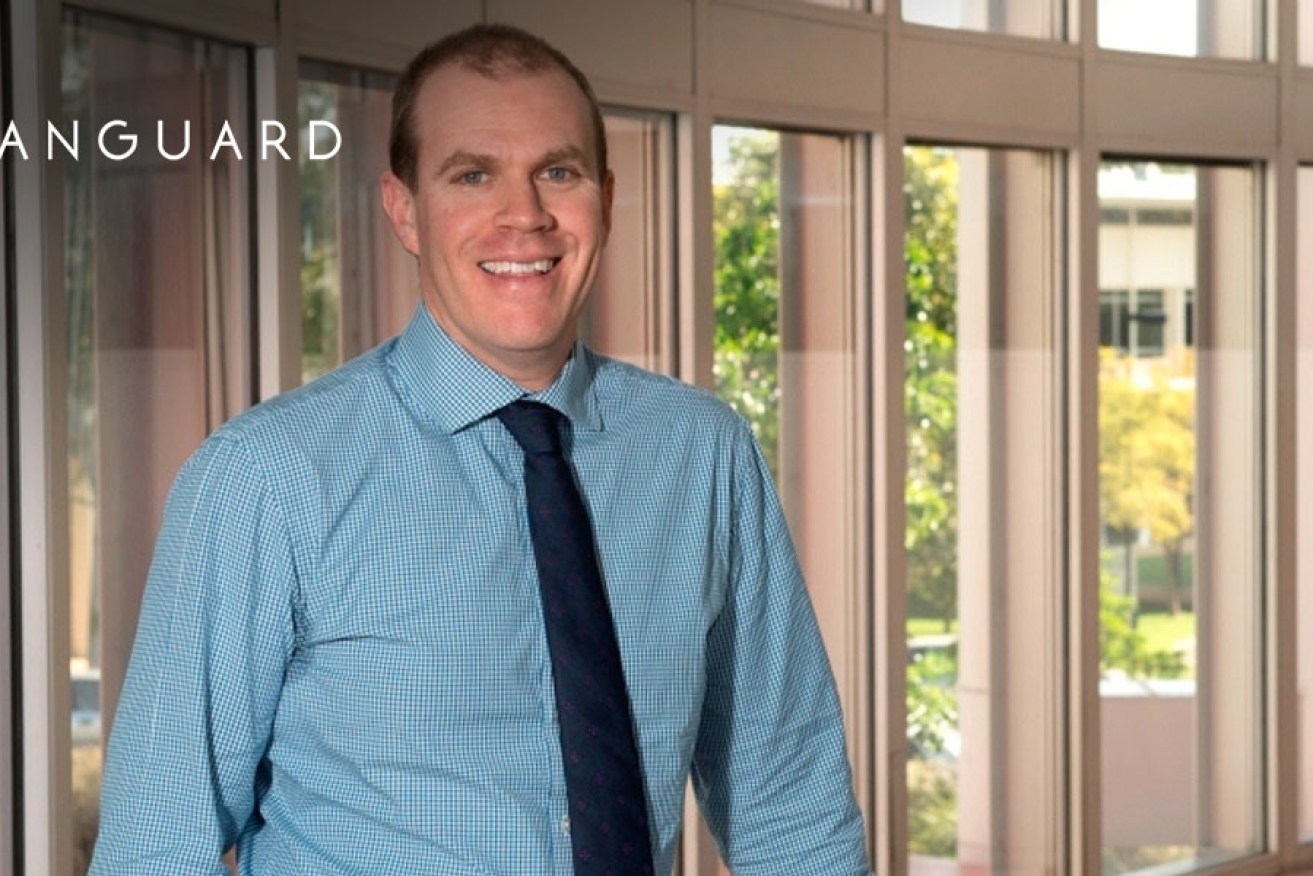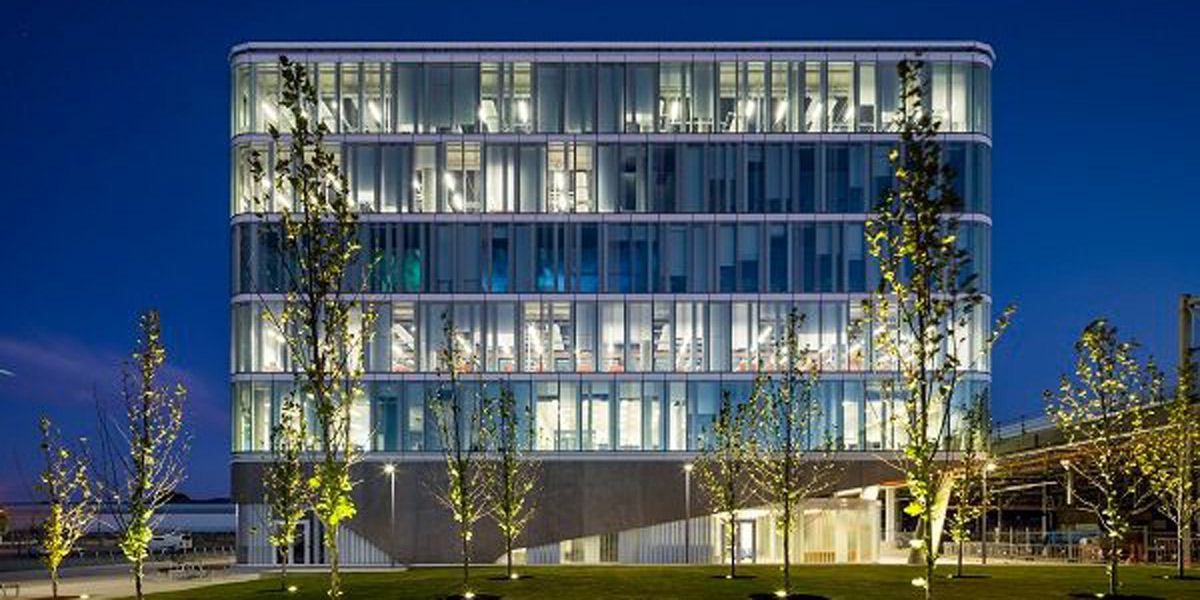The Vanguard: Educating for an unknown future

New Venture Institute director Matt Salier
In a rapidly changing society, universities are facing the challenge of educating students for a world where the jobs, products and services of coming decades cannot even be defined at this time.
It is scenario which is forcing educators to consider new ways of thinking and teaching, to give students the skills and experience required to adapt to emerging technologies and succeed in the modern marketplace.
Flinders University’s New Venture Institute (NVI) is making a tangible contribution to this new teaching paradigm by bringing students, lecturers, researchers, and the business, not-for-profit and government communities together in collaborative projects.
NVI director Matt Salier quotes a recent statistic to define the space and the challenge with which Flinders and other universities are now dealing.
“In 10 years’ time, 75 per cent of the Standard & Poor’s 500 (an index measuring the market value of the top 500 companies listed on the New York Stock Exchange) will be from companies that don’t exist today – that’s $20 trillion of value in the global economy from companies that you and I have never heard of, that don’t exist today, that don’t have a product or service that anyone knows that they need,” Salier told The Vanguard.
“In that framework of disruption of change, you need to be doing what we’re endeavouring to do – which is not necessarily just provide the technical skills to do a job that we know exists and know needs doing, but provide the capability to identify opportunities and take advantage of something that no one had ever seen before.”
Central to NVI’s approach is to draw the business community and not-for-profit and government sectors into the academic environment, posing questions and riddles for students to address, even at very early stages of their university experience.
The goal is to change the way graduating students think and address challenges, to take their focus beyond the singular, problem-solving technical skills which have characterised universities in the past.
But before that outcome can be achieved, there is a more fundamental issue to be addressed – the perception of universities in the business community, particularly amongst small and medium sized enterprises (SMEs).
“Business R&D nationally is $18 billion a year but universities only get $920 million of that – $17 billion plus is spent elsewhere because universities are too hard to engage with,” Salier said.
“People talk about the fact that SMEs just bounce off us because we’re big, we’re bureaucratic and we’re hard to navigate – and that’s a fair comment,” he said.
“So NVI’s role is short circuit that, we’re the front door to the capability that a university intrinsically has. Sometimes that capability is people – students, researchers and academics – and sometimes it’s kit – space, equipment.
“If we can find ways, as we have begun to do, to bring of both of those together to help SMEs, particularly because South Australia is an SME state and economy, to grow and scale their businesses, that’s a tremendous use of public funds, and at the end of the day we are a publicly funded institution.”
For the past 18 months, NVI has been refining its engagement model and is now delivering results.
Salier cites the example of several collaborative projects with Zoos SA to demonstrate its practical outcomes.
One recent project involved NVI taking Zoos SA’s concept of an ‘e-tree’ and asking first year, engineering design students to come up with potential ways that it might be achieved.
Salier said Zoos SA had a concept and some ideas from other zoos around the world but were looking for something “uniquely South Australian” for the zoo at Monarto. He said 210 students considered the issue in tutorial groups and delivered a package of more refined concepts.
A spokesperson for Zoos SA said one of the organisation’s strategic directions was to “digitally enhance the zoo experience”.
“The opportunity to work with the New Venture Institute and our future science, engineering and environmental designers made our vision of an e-tree at Monarto Zoo possible,” she said.
“The student team took the concept, conducted market analysis with our visitors and members both onsite and online, and worked with the Zoo on design requirements. The end concept was an e-tree that would deliver inclusive design and ergonomics.
“The students’ innovative approach meant the e-tree could offer real time information for visitors in the zoo, an opportunity to charge their phones and iPads, seating and even solar powered lighting for night time safaris.”
Matt Salier said the collaboration was very rewarding for Zoos SA and the students.
“Zoos SA are rapt – they got three or four concepts and while it’s not enough for them to go to a professional designer, it’s honed their understanding of what’s achievable and helped them understand things like aesthetics and design principles because the students have learned that and applied it,” Salier said.
“It’s a really light touch but we’ve achieved what we wanted which was a really happy client and students having some engagement. The client has walked away saying ‘this is amazing – we now have a 3D model that we can take to our designer and work this up more professionally’.”
Putting the NVI and student role into perspective, Salier said: “We will never be looking to replace what a PriceWaterhouseCoopers team might do to help a business enter the Chinese market but we can certainly help the company shape the brief for PWC through the work of these students”.
“What you get from the students going through that process is creativity, a bit of greenness that actually gives you the innovation but also the passionate enthusiasm that you often can’t replicate internally.”
The ‘hands on’ experience of real time issues by students engenders what Salier describes as “personal enterprise”.
“We want to create a student in any discipline, in any school, in any faculty, who is innovative, creative and thinks entrepreneurially about the disciple they have chosen to do,” he said.
“If we’re not helping them think about how to be more innovative, more entrepreneurial, more creative and business minded – then we are not doing our job. And that is just as true for nurses as it is for digital technologists, educators and doctors.
“This concept of personal enterprise is what we are delivering in the soft skills space. There are a whole range of competencies that we talk about that underpin innovative, creative entrepreneurial thinking, competencies like business acumen, teamwork, negotiations, and working with others.
“There’s a range of things that feed into those themes and over time, as you mature and have a longer working life, those things become innate to you. But if you can, as we are beginning to do, short circuit the time it takes to gain those skills and to actively practice them, then that creates value for employers as well.
“By instilling personal enterprise, you increase the potential for individual students to go: ‘you know what I think I’ve got something I’d like to pursue myself’.
At which point, graduates and others might engage in the other key dimension to NVI’s work – the support, mentoring and advice for entrepreneurs and start-ups through its Venture Dorm, Enterprise Workshop, Flinders Enterprise Consulting and eNVIsion Incubator Space initiatives.
In 18 months NVI’s scorecard includes supporting 84 start-ups, of which 72 are still operating and have created 32 full-time jobs.
NVI’s “wonderful family of 200 business mentors and industry leaders” has spent 2406 hours mentoring young and mature entrepreneurs. And 102 students teams have assisted 26 businesses with projects to date this year.
From January this year, that activity has occurred in Flinders University’s $120 million investment in a building on the old Mitsubishi site at Tonsley which will help redefine the character of the university in the years ahead through the work of NVI and its other tenants – the University’s School of Computer Science, Engineering and Mathematics, Medical Device Research Institute, Centre for NanoScale Science and Technology, and commercialisation arm, Flinders Partners.
“I love the fact that universities exist and that amazing people are pushing the boundaries of what we know. And it happens in a 1960s building as much as it happens in this building but this building brings it out, it feels more visible, more open, and more accessible. And all of that is critical to the eventual translation of ideas to applied solutions that fundamentally change how we all live and work and exist.
“This is an amazing building – it gives you that energy,” Salier said
The Vanguard is a weekly column highlighting innovation in South Australian business.





